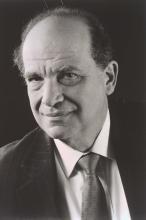Dean, 1983–88
Arthur J. Naparstek was a national policy leader and expert in urban redevelopment whose community-building vision influenced policy locally, nationally, and internationally. Appointed by President Jimmy Carter to both the National Commission on Neighborhoods and the President’s Commission on Mental Health’s Task Panel, Naparstek later served under President Bill Clinton as a board member of the Corporation for National Service. He was also a senior associate at The Urban Institute, where he helped launch HUD’s HOPE VI housing revitalization initiative.
As dean of the Mandel School, Naparstek raised funds for the school’s expansion and helped establish the Mandel Center for Nonprofit Organizations, the Center on Urban Poverty and Social Change, and three off-campus sites. He launched the nationally recognized Intensive Semester program and led MSASS to become the first school to use 4A funds to train income maintenance workers.
Naparstek also applied his expertise internationally, notably in Israel, where he co-chaired Cleveland’s Partnership 2000 with Beit She’an and developed programs to support Ethiopian Jewish immigrants. Throughout his career, he emphasized the importance of engaging citizens as partners in decision-making, a principle he advanced in both practice and policy. He authored four books and numerous articles on mental health and community-building.


